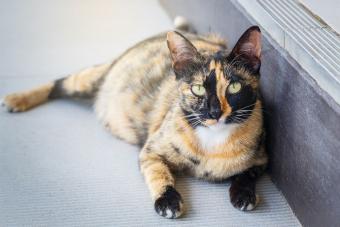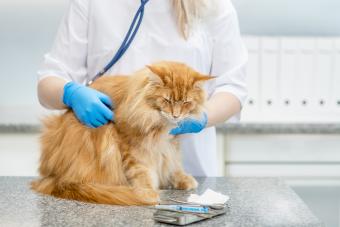
Every cat lover enjoys having their kitty snuggle in close to them but sometimes this isn't so pleasant. If your cat has bad breath, it could just be that you need to clean their teeth more often, or something more serious is going on with your cat's oral health
Why Do Cats Have Bad Breath?
There's a number of reasons why cats can have halitosis and some of them can indicate a serious medical condition. If you've been practicing good dental hygiene with your cat and notice a bad smell coming from their mouth, it's important to see a veterinarian right away.
Dental Disease
Periodontal disease is a major problem for cats, with over half of cats three years or older suffering from dental disease. Bad breath that has a "fishy" tinge to it is one of the signs that your cat may have a problem in their mouth such as gingivitis, periodontal disease, tooth decay or an abscessed tooth, or resorption of one or more teeth. If you notice your cat having difficulty eating, pawing at their mouths, and drooling along with bad breath he or she needs a veterinary dental exam right away. Your vet may have to pull some teeth if they are infected and cannot be saved.
Foreign Body in the Mouth
Bad breath can also develop if your cat has something stuck in its mouth, such as some string or a piece of a toy or a plant like a foxtail or blade of grass. If the item becomes lodged in the mouth, it can lead to excessive drooling and a possible bacterial infection if the object cuts into their gums or tongue. A cat can also develop lacerations and ulcers from items in their mouth, all of which can result in bad breath.
Diabetes
If you notice that your cat's breath has an odd fruity odor, this can be a sign that he or she has diabetes. Some symptoms that are common with diabetic cats include excessive drinking and urinating, and weight loss. If your cat has diabetes your veterinarian will work with you to halt the progress of the disease with a change in diet and supportive care.
Cancer of the Mouth
If tumors form in the mouth, these can be a cause of bad breath, especially if they are not found early and are allowed to fester and become infected. Cancerous tumors in the mouth will give your cat's breath a very foul, rotten odor. If your veterinarian determines your cat has mouth cancer, treatment may include chemotherapy, radiation and surgical removal of the tumors.
Kidney and Liver Disease
Diseases of both these major organs can have noticeable bad breath as an early sign. Bad breath can develop from kidney disease because of an excess of urea in the bloodstream. The breath will have a distinct ammonia or urine-like odor to it. If your cat has been losing weight and drinking and urinating more than usual, or straining to urinate, schedule a veterinary visit right away. With liver disease, the breath will smell like vomit or bile and symptoms will include a yellowish color around the eyes and gums, excessive vomiting and a swollen belly.
Gastrointestinal Disease
If your cat has a stomach disorder, such as an inflamed or enlarged esophagus, you may notice a bad smell coming from their mouth. A veterinarian can examine your cat for signs of gastrointestinal distress and may treat with a combination of corticosteroids, a change in diet, and anti-parasitic drugs if your cat's stomach problems involve worms.

Lymphocytic Plasmacytic Stomatitis
This condition involves inflammation in the mouth that can create a foul, putrid odor. Associated symptoms include bleeding, irritated gums and clear indications your cat is in pain if he or she tries to open or close their mouths or eat. You may also see ulcerations on the cat's tongue, especially if the cat has respiratory symptoms such as discharge from the nose and eyes and sneezing. Stomatitis is often seen in cats with FeLV, FIV, and feline calicivirus. The usual treatment for stomatitis is antibiotics and corticosteroids.
Respiratory Disease
Bacterial and viral infections that cause the cat to sneeze, cough and have a runny nose can lead to bad breath. These conditions can lead to discharge into the mouth from the sinuses as well as excessive salivation which all contribute to increasing the odor in your cat's breath.
Coprophagia
If your cat's breath smells strongly of feces, it's possible he or she may actually be eating their own poop. This is a condition known as coprophagia. There are several reasons a cat may do this, such as malnutrition, stress, or a parasitic infection. If you think your cat may be eating feces keep a watchful eye on him when he uses the litter box and keep the boxes clean. If the condition continues, it's time to meet with your veterinarian.
Your Cat's Diet
Sometimes the reason for a cat's bad breath is fairly benign. Certain diets, particularly ones containing fish or liver, can make your cat's breath have a strong odor. The odor may smell much like your cat's food which is a good sign this is the potential reason for halitosis. A diet made up of mostly or all wet food can also lead to bad breath as dry kibble can help to clean your cat's teeth. A change in diet and regular teeth brushing may eliminate the problem entirely.
Treating Bad Breath in Cats
Helping your cat to get over halitosis depends on what is causing the problem. Antibiotics are usually prescribed if there is any type of infection in the mouth. If dental disease is the culprit your veterinarian will do a thorough teeth cleaning and instruct you on how to do regular cleanings at home, or give you a schedule to bring your cat in to have it done professionally. Your veterinarian may also perform additional tests, such as bloodwork, urine tests, radiographs and ultrasounds if there's a chance your cat has a serious medical condition.

Prevention Is Important
Since periodontal disease in cats is so common, it's important to regularly clean your cat's teeth for an easy way to prevent the disease from happening. If you feel like you can't brush your cat's teeth, speak to your veterinarian about how often you should schedule a dental cleaning at the vet to keep your cat's teeth healthy. You can also use a water additive for your cat, such as Tropiclean, that will make your cat's breath smell fresher.
Keeping Your Cat's Breath Healthy
While a bit of mild bad breath may be normal for a cat depending on how their normal diet smells, any noticeable unpleasant odor is a sign your cat's oral health needs to be checked by a veterinarian. Sometimes bad breath can be one of the first signs that your cat has a serious condition like cancer or kidney disease so getting to a veterinarian without delay is critical to save your cat. If you have concerns about your cat's teeth, speak to your vet who can help you to learn how to regularly brush your cat's teeth and keep them from being one of the many cats needlessly suffering from dental disease.







